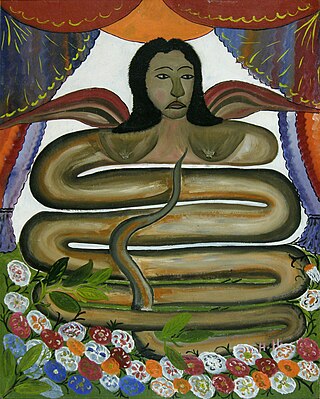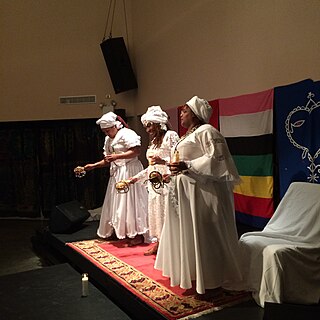
Lwa, also called loa, are spirits in the African diasporic religion of Haitian Vodou. They have also been incorporated into some revivalist forms of Louisiana Voodoo. Many of the lwa derive their identities in part from deities venerated in the traditional religions of West Africa, especially those of the Fon and Yoruba.
Haitian mythology consists of many folklore stories from different time periods, involving sacred dance and deities, all the way to Vodou. Haitian Vodou is a syncretic mixture of Roman Catholic rituals developed during the French colonial period, based on traditional African beliefs, with roots in Dahomey, Kongo and Yoruba traditions, and folkloric influence from the indigenous Taino peoples of Haiti. The lwa, or spirits with whom Vodou adherents work and practice, are not gods but servants of the Supreme Creator Bondye. A lot of the Iwa identities come from deities formed in the West African traditional regions, especially the Fon and Yoruba. In keeping with the French-Catholic influence of the faith, Vodou practioneers are for the most part monotheists, believing that the lwa are great and powerful forces in the world with whom humans interact and vice versa, resulting in a symbiotic relationship intended to bring both humans and the lwa back to Bondye. "Vodou is a religious practice, a faith that points toward an intimate knowledge of God, and offers its practitioners a means to come into communion with the Divine, through an ever evolving paradigm of dance, song and prayers."

Obeah, also spelled Obiya or Obia, is a broad term for African diasporic religious, spell-casting, and healing traditions found primarily in the former British colonies of the Caribbean. These practices derive much from West African traditions but also incorporate elements of European and South Asian origin. Many of those who practice these traditions avoid the term Obeah due to the word's pejorative connotations in many Caribbean societies.
Palo, also known as Las Reglas de Congo, is an African diasporic religion that developed in Cuba during the late 19th or early 20th century. It arose amid a process of syncretism between the traditional Kongo religion of Central Africa, the Roman Catholic branch of Christianity, and Spiritism. An initiatory religion practised by paleros (male) and paleras (female), Palo is organised through small autonomous groups called munanso congo, each led by a tata (father) or yayi (mother).
Kumina is an Afro-Jamaican religion. Kumina has practices that include secular ceremonies, dance and music that developed from the beliefs and traditions brought to the island by Kongo enslaved people and indentured labourers, from the Congo region of West Central Africa, during the post-emancipation era. It is mostly associated with the parish of St. Thomas in the east of the island. However, the practice spread to the parishes of Portland, St. Mary and St. Catherine, and the city of Kingston.

Oungan is the term for a male priest in Haitian Vodou. The term is derived from Gbe languages. The word hounnongan means chief priest. ‘'Hounnongan or oungans are also known as makandals.
Tambor is a coastal Afro-Venezuelan music and dance. It is a cultural manifestation originating in the slaves from Africa. The drums are of Kongo origin, as are most musical genres of Afro-Venezuelan origin. The Tambores are done with the playing of a cumaco which is a long cylinder-shaped drum played on the ground while the player sits on it and plays. It also consists of drums known as campanas which are played by sitting down in a chair and playing them with the hands. These drums are often used for religious ceremonies. In the Afro-Catholic community, it is used to honour and invoke San Juan or some other Saint. In the Maria Lionza context, the drums are used to invoke the spirits to possess the materia or medium as well as to animate the spirit and give it force.
The Petwo, also spelled Petro and alternatively known as dompete, are a family of lwa (loa) spirits in the religion of Haitian Vodou. They are regarded as being volatile and "hot", in this contrasting with the Rada lwa, which are regarded as sweet-tempered and "cool."

A manbo is a priestess in the Haitian Vodou religion. Haitian Vodou's conceptions of priesthood stem from the religious traditions of enslaved people from Dahomey, in what is today Benin. For instance, the term manbo derives from the Fon word nanbo. Like their West African counterparts, Haitian manbos are female leaders in Vodou temples who perform healing work and guide others during complex rituals. This form of female leadership is prevalent in urban centers such as Port-au-Prince. Typically, there is no hierarchy among manbos and oungans. These priestesses and priests serve as the heads of autonomous religious groups and exert their authority over the devotees or spiritual servants in their hounfo (temples).
The Rada are a family of lwa spirits in the religion of Haitian Vodou. They are regarded as being sweet-tempered and "cool", in this contrasting with the Petro lwa, which are regarded as volatile and "hot".

Haitian Vodou is an African diasporic religion that developed in Haiti between the 16th and 19th centuries. It arose through a process of syncretism between several traditional religions of West and Central Africa and Roman Catholicism. There is no central authority in control of the religion and much diversity exists among practitioners, who are known as Vodouists, Vodouisants, or Serviteurs.

Espiritismo is a term used in Latin America and the Caribbean to refer to the popular belief that evolved and less evolved spirits can affect health, luck and other aspects of human life.

Santería, also known as Regla de Ocha, Regla Lucumí, or Lucumí, is an African diasporic religion that developed in Cuba during the late 19th century. It arose through a process of syncretism between the traditional Yoruba religion of West Africa, the Roman Catholic form of Christianity, and Spiritism. There is no central authority in control of Santería and much diversity exists among practitioners, who are known as creyentes ("believers").

Frisner Augustin was a major performer and composer of Haitian Vodou drumming, and the first and only citizen of Haiti to win a National Heritage Fellowship from the National Endowment for the Arts in the United States, where he resided for forty years.
The religion of Haitian Vodou has been present in Cuba since at least the 18th century. It was transmitted to the island by Haitian migrants, the numbers of whom grew rapidly in the early 20th century, and is primarily practised by their descendants. It is distributed primarily in eastern parts of the island, especially in Oriente. In Cuba, some practitioners of Haitian Vodou have also become involved in the related Afro-Cuban religion of Santería.
In the Caribbean religion of Santería, individuals are required to go through an initiation process to become a full practitioner, known as a santero (male) or santera (female).
Santería is an Afro-Cuban religion that arose in the 19th century.
Bondye, also known Gran Maître, is the supreme creator god in the African diasporic religion of Haitian Vodou. Vodouists believe Bondye was responsible for creating the universe and everything in it, and that he maintains the universal order. They nevertheless deem him to be transcendent and thus inaccessible to humans, who must instead interact with spirits called lwas.
Voodoo in popular culture encompasses various representations of practices associated with different forms of voodoo, including Haitian Vodou and Louisiana Voodoo, and other elements attributed to African diaspora religions, with such representations often deviating substantially from any actual voodoo practices or beliefs. Tropes regarding voodoo appear most often in supernatural fantasy or horror films, with common themes including the activity of witch doctors, the summoning or control of dark spirits, use of voodoo dolls to inflict pain on people remotely, and the creation of zombies.
The Bizango are secret societies active in Haiti. Many of their practices are associated with Haitian Vodou.







